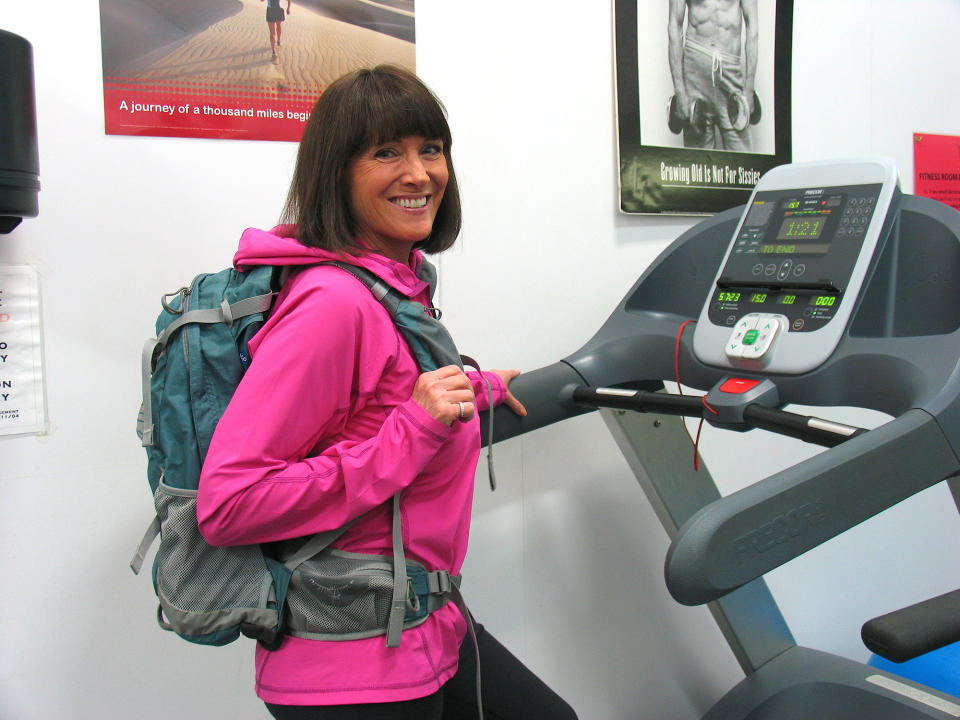How an MS diagnosis inspired these 5 people to get into the best shape of their lives

After the shock of being diagnosed with multiple sclerosis starts to wear off, many find that MS becomes a driving force for them to make healthier changes in their lives, from staying active and eating right to reducing stress.
Ardra Shephard, who lives in Toronto and writes the blog Tripping on Air, says her MS diagnosis was a real wakeup call for her. “I was 22 when I was diagnosed, and I felt like my well-being and health needed to be top priority, and to not just ‘write off’ things I experience,” Shephard tells Yahoo Lifestyle.
For Shephard and many of the 2.3 million people around the world who have MS — a chronic and often debilitating disease of the central nervous system — prioritizing your health and practicing self-care can have a profoundly positive effect. “In general, eating a healthy diet, keeping stress levels manageable, and exercising are going to leave people better off,” James Stankiewicz, MD, associate neurologist at Brigham and Women’s Hospital and clinical director of the Partners Multiple Sclerosis Center at that hospital, tells Yahoo Lifestyle. “They’re good principles for healthy living, and it will leave MS patients in better shape.”

While there’s no magic diet for MS, many end up gravitating toward healthier food choices in general, with anti-inflammatory foods often at the top of the list. In fact, research shows that what you eat can have a powerful impact on the disease. A 2017 study in the journal Neurology shows that eating a diet rich in vegetables, fruits, and whole grains is linked to having less disability and fewer MS symptoms, such as fatigue and pain. Other research shows that vitamin D supplements help. “Low vitamin D may predispose people to have MS or make the disease worse,” notes Stankiewicz, who recommends his patients take 3,000 IUs daily and have their physician check their blood levels regularly.
Although there’s only anecdotal evidence, according to Stankiewicz, some swear by the Wahls Protocol (a Paleo-like diet focused on vegetables, berries, meat, and seaweed) or going gluten-free.
After being diagnosed with MS nearly 13 years ago, David Lyons tells Yahoo Lifestyle that he’s put a bigger effort into including anti-inflammatory foods and supplements in his daily diet. “With MS being a disease of not only nerve damage but also inflammation, I need to keep my system working against that inflammation,” says Lyons, who lives in Murrieta, Calif., and is the founder of MS Fitness Challenge, which encourages people with MS to focus on fitness and nutrition.
Lyons is a proponent of the Wahls Protocol and eats “platefuls” of green leafy vegetables like kale, broccoli, and spinach daily. “I stick with healthy fats such as coconut oil and extra virgin olive oil, and I stay away from empty and unhealthy carbohydrates like white flours, breads, and pastas. The protein I take in comes from unprocessed meats, fish, and poultry like bison, chicken, turkey, and salmon, and I do eat dozens of pasture-raised organic egg whites with a few yokes thrown in almost every day. Almost everything I eat is organic, and everything I eat is void of artificial ingredients.”

Lyons isn’t the only one to give his eating habits a makeover post-diagnosis. “About 10 months after my diagnosis, I radically changed my diet,” says Shephard. “Since then, I’ve vacillated between strict regimens and not wanting to deny myself things like croissants and cheese. I’m currently on a gluten-free, dairy-free, sugar-free thing, which is annoying to anyone who eats with me, but I think it’s doing good things. Of course, I still allow myself generous amounts of wine.”
Lori Schneider — who was diagnosed with MS in 1999 and who 10 years later impressively became the first person with MS to reach the peak of Mount Everest — knows that giving her body the proper fuel is key to staying strong. “For me that means starting out the day with a healthy smoothie filled with things like kale, blueberries, walnuts, coconut oil, almond milk, Greek yogurt, chia seeds, and a high-quality protein powder,” she tells Yahoo Lifestyle.

The avid climber, who lives in Bayfield, Wis., has an organic green salad with half an avocado slathered in olive oil (for a good dose of healthy fats) at lunch or dinner, along with some protein, such as a cup of bean soup or some sliced turkey breast.
Work it out
Healthy eating and being physically active go hand-in-hand, and they’re especially important when it comes to managing MS. The tricky part is that people with MS have trouble with temperature changes — namely, heat — which makes getting in a good workout particularly challenging.
“As core body temperature goes up, that can worsen MS symptoms,” points out Stankiewicz. “It doesn’t mean people shouldn’t exercise and sweat, but they should realize it could bring old symptoms up — not new damage.”
Victoria Reese of Los Angeles knows this firsthand. Reese, who was diagnosed with MS in 2012 and founded the Illmatic campaign to unite women of color who have MS, tells Yahoo Lifestyle that working out can be “frustrating” since the point is to sweat. She’s learned to make accommodations, such as exercising near a fan or an open door at the gym to stay cool.

That’s one of the reasons why Stankiewicz recommends swimming, which he says is “naturally cooling,” as well as yoga, which also improves balance and lowers stress levels. Plus research shows those exercises are particularly beneficial to people with MS: A 2016 study found that both yoga and water workouts can help improve MS symptoms, such as fatigue and paresthesia (a burning or tingling sensation), as well as depression.
Balance issues are another common problem people with MS face. To counter that, Schneider does exercises that keep her core muscles engaged. “Exercise and stretching seem to make my MS symptoms better, because they keep me flexible, produce those ‘feel good’ endorphins, and strengthen the muscle groups,” she says. “The key is achieving that balance between getting your body moving and finding pleasure in the type of exercise you choose.”
As an athlete and bodybuilder for most of his life, working out is a form of pleasure for Lyons. In fact, you’ll find him at the gym six days a week. “I am a firm proponent that exercise can and will help manage and improve MS symptoms and limitations,” he says. “The damage to nerve fibers in the central nervous system, caused by MS, impairs the signaling that occurs between your nerves and muscles and makes it difficult to move them correctly. People with MS, including me, have many symptoms such as pain, numbness, lack of coordination, spasms, spasticity, and others. Exercising strengthens the muscles and also creates a mind-body connection that can enable someone with MS to do the things the nerves are telling them they cannot.”
This comes from someone who was told, at diagnosis, that he would be wheelchair-bound due to the amount of nerve damage he sustained in his initial MS attack. “The reason I have never been confined to a wheelchair is directly related to the strength I have in my legs from the squats, leg extensions, leg presses, and other leg exercises I have done,” he says. “I have no feeling other than pins and needles in my left arm, hand, and fingers, yet I can still handle a 60-pound one-arm dumbbell curl. Will exercise cure MS symptoms? No. But exercise will enable me to continue to accomplish amazing things.”

Of course, not everyone can be a bodybuilder like Lyons or a mountain climber like Schneider — nor do they have to be. Ashley Ringstaff, a San Antonio resident and mom who blogs about life with MS, tells Yahoo Lifestyle she doesn’t always make it to the gym, but she finds ways to stay physically active, including at-home workouts. “Pinterest is a great resource for all different kinds of exercises for all different types of mobility levels as well,” she notes.
But overdoing it at the gym can have consequences for people with MS that go beyond sore muscles. Stankiewicz points out that, if they push themselves too hard, they can become fatigued and will often feel worse the next day. “When you work out, you’re told to push yourself and chase the burn and keep going,” says Reese. “You want to do that, but then you’re always scared you’re going to fall or push yourself too hard — if I go up one more level I could overexert myself. Living in this box of limits is challenging.”
That’s why Reese tries to listen to her body and, like many others with MS, she has some post-workout self-care strategies that involve rest. Working out is “very draining,” she says. “I have to sometimes schedule time to rest after exercising or take a bath in Epsom salts.”
Dialing down stress
Living with MS can be stressful enough, but stress can also make symptoms flare up. That’s why finding ways to dial down stress is particularly important. For Schneider, she attends a weekly meditation class and practices simple breathing and relaxation techniques on a daily basis. “Just taking time to sit for a few minutes and do some deep breathing helps center me,” she says. “I also play relaxing spa type music all day long, in an effort to create an atmosphere of calm.”
Reese is also a fan of meditation. “It’s been a life-changer,” shares Reese, who lately has been using the popular Headspace meditation app. “I do it every day to combat stress, and it just takes 10 minutes of my day.”
An admitted type A personality, Lyons prefers to train with heavy weights at the gym to de-stress rather than do yoga and meditation (though he recommends both to people with MS). “For me, I cannot stay still long enough to de-stress any other way,” he shares.
Ringstaff also finds that working out helps lower her stress levels, but she knows when to have a healthy dose of sitting still. “I like to get lost in a book as well,” she says. “I even go to the coffee shop and people watch, or just have some ‘me time’ and do what I want with no one asking me for help with something. I can honestly say that this has really helped my stress levels and overall emotional health.”

Despite dealing with an often debilitating disease for which there is no cure, many have found that making these healthy lifestyle changes has dramatically improved their lives. Schneider feels she’s only gotten stronger over the years — not just physically but also mentally: “I have learned some lessons along the way too,” she says. “After completing Everest and the Seven Summits, I no longer need to prove anything to myself. It is not our physical feats that make us strong or courageous. I’ve learned that it’s what we have inside that makes us tough, whether on a mountaintop or in our day-to-day lives.”
Advice for the newly diagnosed
When Reese was diagnosed with MS, she, like many others, had a tough time accepting the news. Her physician, who diagnosed her, gave Reese a paper printout about MS. “It took me about six months before I could read the articles without being so devastated and too nauseous to look away,” she shares.
Her advice to those newly diagnosed with MS? Give yourself time to cope and accept the diagnosis. “If you don’t allow yourself to go through those stages you’re not going to heal, not physically but emotionally,” Reese says. “It’s a heartbreak when you get diagnosed with MS or any illness. You’re also very scared of the unknown. Give yourself time to get comfortable and accept you have this, and then come up with a game plan of how you’re going to deal with it and move forward. You don’t have to tell everybody in the beginning. Tell your loved ones, though, so they can be supportive.”
Ringstaff echoes that advice. “Being newly diagnosed is very overwhelming,” she shares. “I was told a lot of things when I was first diagnosed, and I didn’t really ‘hear’ a lot of it, because I was still ‘grieving,’ as I like to call it. I have said this time and time again: Ever since I got diagnosed my priorities changed. My friends changed. There is so much change going on it’s insane, but you will be OK.”
As Lyons puts it: “MS is something we have. It is not something we are.”
Above all, Ringstaff and others stress the importance of putting yourself — and your health — first: “What used to be a top priority to you, takes a back seat,” Ringstaff says about getting an MS diagnosis. “In order for you to be the best person you can be for your family and friends, you have to be the best person you are for yourself first and foremost. This is your life, your future, so take charge of it. Be your own advocate, don’t settle for anything that you don’t feel is right … and never stop fighting.”
Read more from Yahoo Lifestyle:
The theory that the flu shot is dangerous is growing, but doctors say that’s ‘outrageous’
How celebs like Gabrielle Union, Jennifer Lopez, and Kris Jenner de-stress
Before losing battle with cancer, this 27-year-old woman penned a heartbreaking, eye-opening letter
Follow us on Instagram, Facebook, and Twitter for nonstop inspiration delivered fresh to your feed, every day.


